Punjabi Folktale
- Syeda Eesha Zainab

- Nov 7, 2021
- 11 min read
Updated: Nov 21, 2021

In the village of Takht Hazara there once lived a young man named Dheedo Ranjha, a Jatt of the Ranjha tribe. The Ranjha are found in Sargodha, Gujrat, Jhelum and Gujranwala districts of West Punjab. He was the youngest son of a wealthy landowner, and as the youngest, he was a trifle spoiled. Rather than working or managing the family property, he spent his days lazing in the sun and playing his flute.
Unfortunately, his father eventually died, and the sons divided the land amongst themselves. The older brothers never thought much of the youngest, so when they divided the land they gave Ranjha the worst, most infertile part of the property. Ranjha tried to work his land for a while, to no avail. Disgusted, he took his flute and left Takht Hazara.
The going was hard, because Ranjha was used to the good life on his family’s property, and now he had to beg for scraps to live — not always successfully. But he must have been a good person at heart, because heaven looked after him.
One night Ranjha took shelter in a mosque. To pass the time, he played his flute. His playing attracted the villagers, who all came to listen to the beautiful music. It also attracted the attention of the mullah in charge of the mosque. The mullah tried to stop Ranjha from playing, scolding him for desecrating the mosque with his music. Ranjha turned on him, saying that a little music was nothing compared to the hypocrisy of the so-called holy men.
You and your kind, with your beards, try to pretend to be saints, but your actions are that of the devil. You run around after women in mosques… you are like curses clinging to the house of God.
The mullah was furious, naturally, but there was nothing he could do — the villagers refused to back him up (perhaps they secretly agreed with Ranjha). Finally, the mullah left, and Ranjha spent the night in the mosque, and then traveled on the next day.

Eventually, Ranjha reached the banks of the River Chenab, just as the sun began to set. He asked Ludan, the ferryman, to take him to the city of Jhang on the other side. But Ludan refused, because it was getting dark and he suspected Ranjha of being a thief or highwayman who planned to rob Ludan as they crossed the river. Thinking that he had no choice except to camp out on the side of the river, Ranjha sat down on the river bank, pulled out his flute, and began to play a low, melancholy tune. The sound was so beautiful that everyone who heard it felt moved to pity, and between their intercessions on Ranjha’s behalf, and the lovely sound of the flute itself, Ludan’s heart softened and he agreed to take Ranjha across.
After Ranjha boarded the ferry, he made himself comfortable on a luxurious red and white couch on the ferry. At first Ludan tried to stop him — the couch belonged to Heer, the daughter of Mihr Chuchak, the head of the Siyal clan. Heer was an extremely beautiful woman, born into a wealthy family of the Sial clan in Jhang, West Punjab. Sials are a Rajput clan who inhabit Jhang region of West Punjab and founded the city of Sialkot. But Ranjha continued to play his flute, and Ludan, spellbound, let Ranjha sleep where he could.
The next morning, Heer and her girlfriends arrived at the river, sweeping down on the ferry “as a hailstorm sweeps over a field.” Noticing Ranjha asleep on her couch, Heer castigated Ludan loudly, then threatened to have Ranjha beaten for his insolence.

But when Ranjha opened his beautiful eyes, Heer changed her tune. And Ranjha fell in love with Heer at first sight, too.
She had a face like the full moon, eyes that sparkled like precious gems, teeth so white like the petals of the jasmine flower, lips like red rubies….
They spent the rest of the day together; Ranjha told Heer his life story. By the end of the day, Heer swore to be Ranjha’s forever.
The next day Heer brought Ranjha to her father, Mihr Chuchak, saying “Father, I have found someone to herd the buffaloes.”
Chuchak was skeptical: Ranjha, with his beautiful long oiled hair and smooth skin, looked more like a rich man’s son (which he was) than like a herder or a laborer. But Chuchak loved his daughter and trusted her judgement, so he hired Ranjha.
Every day, Heer brought Ranjha milk and bread, or sweets and rice, and spent the whole day with him in the forest. She neglected her spinning and her household chores, she abandoned all her girl friends. Soon gossip spread throughout the village. Who was this mysterious buffalo herder who insisted that only Mihr Chuchak’s daughter bring him food, and who oiled his long hair every day with almost a quart of ghee?
The gossip reached the ears of Kaidu, Heer’s uncle, who began to lurk in the forest, trying to catch the two together. One day Kaidu found Ranjha alone in the forest, and came up to him, pretending to be a beggar. Ranjha, remembering the days on the road when he, too, had to beg for food and shelter, gave Kaidu half a pastry — a pastry that Heer had made for him.
Kaidu took the pastry and brought it before the village elders as proof of Heer’s disobedience and wanton behavior.
I have seen Heer and Ranjha in the forests, and I tell no lies.
Ranjha will take away Heer, and there will be shame to the Siyals.
The elders went to Chuchak and told him about Kaidu’s accusation. Chuchak was furious. “Kaidan is a talebearer and a liar,” he said. “He chases moths all day.”
But Kaidan went to Heer’s mother, urging her to do something. In the face off all the family pressure, Chuchak called Ranjha to him one night after Ranjha had returned with the buffaloes. In front of all his kinsmen, Chuchak dismissed Ranjha. Ranjha threw down his staff in a rage.
“For twelve years [!!] I have tended your buffalo and now you turn me away without wages!”
And Ranjha turned on his heel and left.
But now all the village folk began to talk, criticizing Chuchak for dismissing Ranjah without even paying his wages; and of course Heer was inconsolable. To calm the situation down, Chuchak relented. He took Ranjha back into his service — and more.
Before 70 Khans and 72 nobles Chuchak betrothed Heer to Ranjha, saying:
“As long as thou shalt live she is thine, and when thou art dead she will not deny it.
If any one tear Heer from thee I will bear witness against him in the Court of God.”
But Heer’s mother and uncle brought Heer before the qazi, the judge, who reminded Heer of her duty to respect her family and their position in the village. It was beneath her to consort with buffalo herders. Heer refused to give up Ranjha.
As wine-bibbers cannot desert the bottle, as opium-eaters cannot be without their drug, so I cannot live without Ranjha.

After much back-and-forth, the qazi still couldn’t change Heer’s mind. Frustrated, he told the Siyals that Heer was too stubborn, and to avoid further scandal they should marry her off right away. The Siyals called a clan meeting.
Chuchak wanted to marry Heer to Ranjha, but his kinsmen overruled him. Even if the buffalo herder were noble-born, he was only a Ranjha of Takht Hazara — too lowly a family to marry a Siyal. The family decided to marry Heer off to Saida, of the Khera clan.
The Siyals and the Kheras arranged the match, but on the day of the wedding ceremony Heer refused to say “I do,” saying loudly (at the wedding!) that she had been betrothed to Ranjha and that their union had been blessed by Heaven and the saints.
Muhammad formed the marriage procession and Brahma set up the posts of the marriage canopy. The angels sang songs of rejoicing and fairies brought the henna. The Panj Pir [Five Saints] performed the ceremony and Khizar [Khidr] was a witness.
But it was no use. Heer’s parents signed the marriage papers anyway, and the Kheras took Heer back to Rangpur, to Saida’s house.
In the meantime, a heartbroken Ranjha had returned to Takht Hazara, but he couldn’t forget Heer. Resolving to search for her, Ranjha made his way to Tilla Jogian, the temple where the jogi Gorakh Nath lived. Bowing before Gorakh Nath, Ranjha asked to become a jogi, a beggar monk. At first, Gorakh Nath refused, as he recognized that Ranjha was noble-born; he doubted (correctly) that Ranjha had the humble nature of the true jogi.
So Ranjha stole Gorakh Nath’s conch, the one Gorakh Nath used to call his followers in for their evening meal. He buried the conch, committing it to the care of Mother Earth and Saint Khizar. Without the conch, Gorakh Nath couldn’t summon his jogis. To keep his followers from starving, Gorakh Nath agreed to let Ranjha become a jogi.
Then Ranjha dug up the conch and blew it, once to the east and once to the west, to summon the jogis to their meal (he kept the conch, too). Then Gorakh Nath rubbed Ranjha with ashes, shaved his head, pierced his ears, and gave him a begging bowl. He told Ranjha, “Call the young women ‘sister’ and the married women ‘mother.’ Beg throughout the city and bring no shame on the profession of begging.”
But Ranjha threw away the begging bowl and earrings and rubbed off the ashes. “I was right about you!” exclaimed the guru. But Ranjha only laughed.
We Jatts are cunning — we use all means to get what we want. What can I do with a beggar’s bowl, whose heart is set only on plowing? How can I call her ‘mother’ for whose sake I would become a jogi?
At first, the guru was angry, but then he realized how deeply in love Ranjha was, and how desperate. Moved to pity, Gorkah Nath blessed Ranjha and prayed that he would achieve his desire. At Ranjha’s request, Gorakh Nath sent forth his crow, to search for Heer.

The crow flew from town to town, from house to house, until it arrived in Rangpur and found Heer, wasting away in Saida Khera’s house. After telling Heer of Ranjha’s faithfulness (yes, the bird talked), the crow returned to Tilla, bringing the news back to Ranjha.
Ranjha made his way to Rangpur, disguised as a jogi, begging at each village on the way. When he arrived in Rangpur, all the women noticed this beautiful young jogi and flocked to him. They poured out their troubles: with their in-laws, their husbands, their neighbors. Ranjha listened to it all and counseled the women, while he searched for the Khera household.
When he found the right house, he knocked on the door, pretending to beg for alms. Heer’s sister-in-law Sehti answered. Watching Heer’s and Ranjha’s reactions when they saw each other, Sehti quickly figured out who this handsome jogi really was. She agreed to help them — if they would help her escape to her lover, a Balochi camel driver named Murad.
Heer and Sehti hatched a plan. Heer cut her own foot as the two women walked in the garden, and pretended that she had been bitten by a snake. Sehti told the family that there was a wise jogi staying in the village, and convinced Saida, Heer’s husband, to bring the jogi to the house to cure Heer. Saida agreed. The lovers reunited as Ranjha “cured” Heer of the snakebite.

After a few weeks, the couple planned their escape. Sehti asked to go with them, and begged Ranjha to help her find Murad. Ranjha blew on his conch. The sound reached out, far and wide, and Murad heard it as he slept. He dreamt that Sehti called him, asking him to come to her. When he woke, Murad set out at once for Rangpur.
On a Sunday night in June, the three escaped. They met Murad, who put Sehti on his camel. The two of them escaped over the River Chenab, while Heer and Ranjha fled to Qabula, the city where Raja Adali ruled.
The next morning one of Heer’s maids told the family what had happened, and the Khera men set off to find them. They caught up to Murad and Sehti, but the couple had made it safely back to Murad’s people, and the Balochi forces drove back the Khera pursuers. Heer and Ranjha weren’t so lucky. The Kheras captured them and beat Ranjha unmercifully, then brought him before Raja Adali, demanding that Ranjha be put to death. Heer’s uncle Kaidu also came to testify against Ranjha.
But Chuchak testified that he had betrothed Heer to Ranjha.
In the Court said Chuchak: “I tell no lies.
Before 70 Khans and 72 nobles I gave Heer to Ranjha.
Ranjha grazed my buffaloes for 12 years and took no pay at all from me.
My brethren thrust him away, and seizing Heer married her to the Kheras.
If there be a lie in this ask Heer: she is in thy Court.
If there be a lie in this may I be punished in the Court of God.”
So Adali called Heer in to testify. When she walked into the court, unveiled, Adali saw how beautiful she was and lost his head.

Said Adali to Ranjha : “Thou too art a liar: Heer was first of all betrothed to me!”
And he took Heer away to his palace.
Heer prayed to God for protection, and when Adali tried to come to her bed that night, he burst into flames! Luckily, he managed to douse himself with water and save himself. Ranjha also called out to Heaven, playing his flute. Heaven heard.
The sound of the flute reached to Mecca and a company of 70 saints came up.
The sound of the flute reached to Multan and the Five Saints came in majesty.
The sound of the flute brought the Mother, the Goddess Durga, on her lion to Ranhja.
At the sound of the flute came Sakhi Sarwar the Warrior, galloping up on his mare Kakki.
At the sound of the flute came Hanuman, the leader, with his army.
The army cut down the garden of Adali and left not a tree remaining….
All the saints collected took burning logs and set fire to Adali’s city.
Burning went Adali into the reservoirs and water was thrown over the people.
And when the water reached the fire it blazed forth twofold!

The Raja’s advisors told him to restore Heer to Ranjha, to save the city. So Raja Adali sent for Ranjha and agreed to marry him to Heer. Then Ranjha blew on his conch.
When Ranjha sounded his conch, Indra caused rain;
And all the people in Adali’s city lived in happiness.
Ranjha and Heer came together, for God favoured them.
Raja Adali did justice and turned away his face from bribes.
Raja Adali himself gave Heer away to Ranjha, and the entire city attended the wedding. Then the two lovers rode away into the sunrise, and (like Sehti and Murad) lived happily ever after.They lie buried in Jhang, Heer’s hometown. They are visited by lovers and admirers of love in life and life and love.
Further Note
Originally composed by Damodar Gulati in 1605. Damodar Gulati also known as Damodar Das Arora of Jhang, the wise resident of Sultanpur, the greatest classical story teller of Punjab. He was the first to compose the legend of Heer Ranjha that captured the imagination of Punjabis. “Damodar is my name, Gulati is my caste. I came to the fiefdom of the Sial my heart using its discretion led me to spend my days there,” is what he says in the opening lines of his story.
The story was rewritten by Ahmad Gujjar in the 1680s, further rewritten by Shajahan Muqbil in the second quarter of the 18th century. Waris Shah built upon Muqbil’s work and the status of a classic was accorded to his 1766 composition. Waris Shah (Urdu: السيد وارث علي شاه النقوي الرضوي البهكري البدراني) , ਵਾਰਿਸਸ਼ਾਹ (Gurmukhi); 1722–1798) who was a Punjabi Sufi poet of Chishti order, is renowned for his contribution to Punjabi literature by immortalizing the love story of Heer Ranjha.

The most famous version of Heer Ranjha — the “official” version, you might say — is the epic 18th century poem by Waris Shah. Most versions end with Heer and Ranjha’s marriage. Waris Shah added a tragic ending to his literary adaptation:
Humiliated at their loss of face, Kaidu and his kinsmen plot to kill Heer. The family talks the couple into having a proper wedding, in Jhang (Heer’s hometown).Ranjha returns to Takht Hazara to fetch his family for the Baraat. The Sayals bring Heer back to Jhang, ostensibly for the wedding. Instead, they quietly poison her. One version says they gave her poison laddu, a sticky sweet dessert often served at weddings. When Ranjha realizes that Heer is dead, he eats the rest of the poison laddu, and dies, too.
This story is not just a love story. It is said that this story exemplifies the quest to find and understand God. This can be seen in Ranjha's character, the jogi who searches endlessly for his Heer. At the end during the wedding ceremony, when he thinks he finally has her, she escapes his hands via death. Just when you think you understand God, there is something that will test you again. There is so much to this story. It is said that Waris Shah spent pages and pages describing intricate details of both of the principal characters. He wrote them with such passion and depth that to this day, they and their love are immortal.



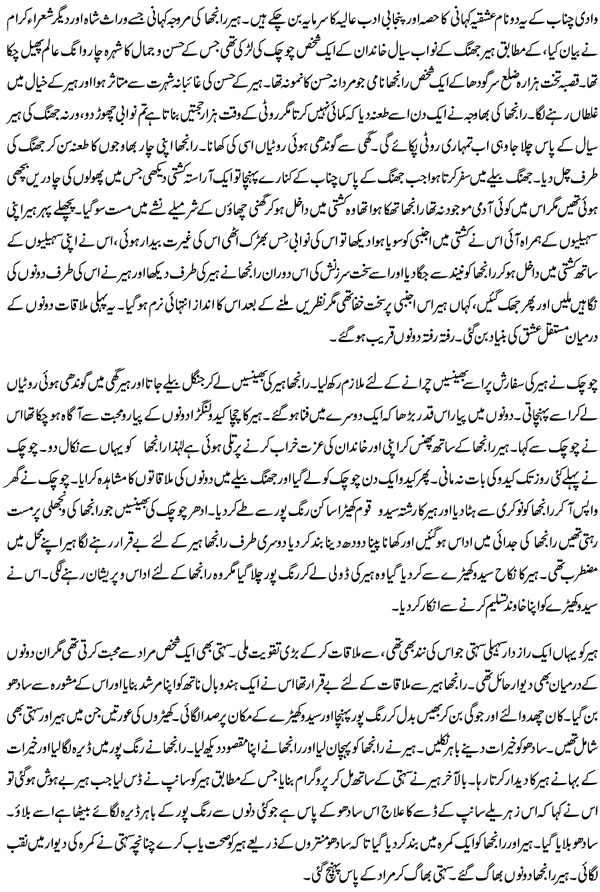

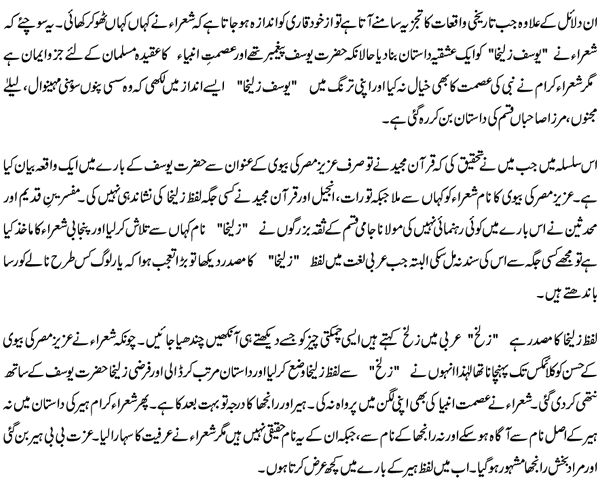
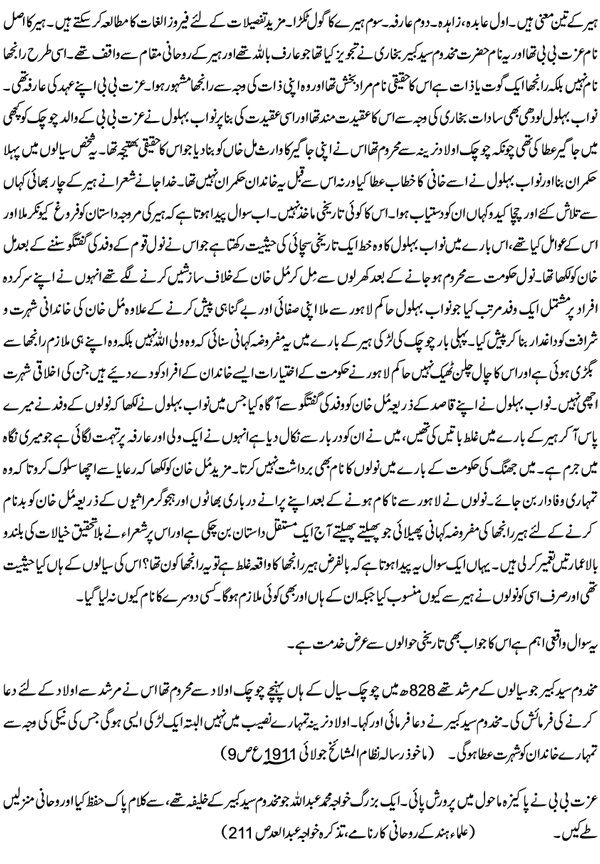
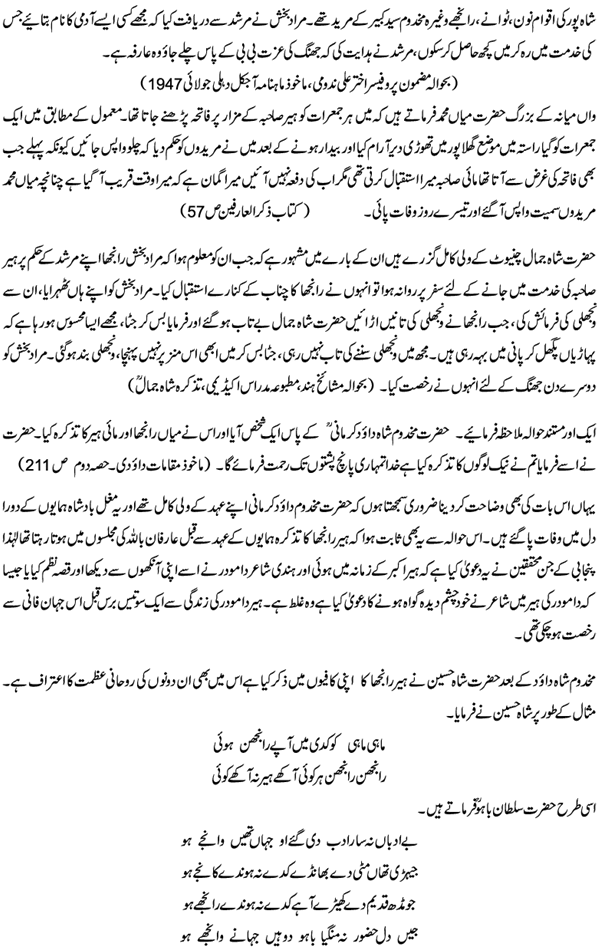
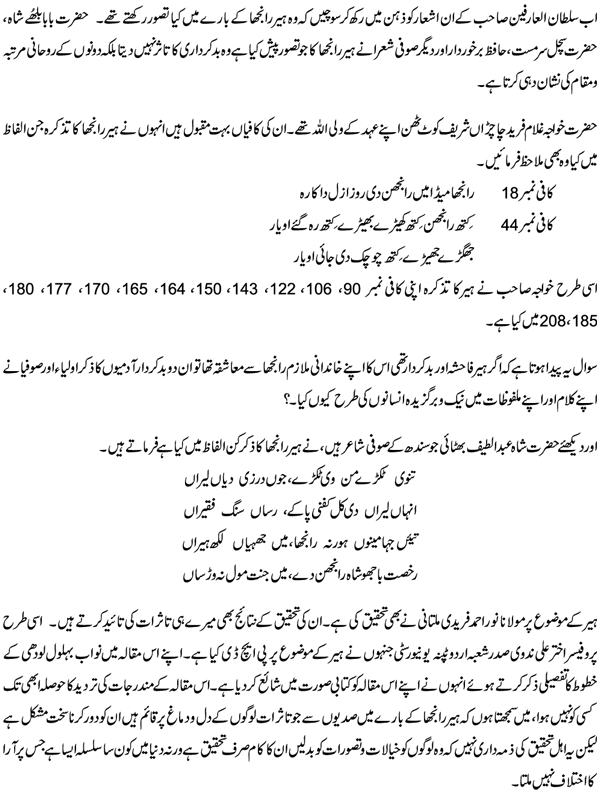
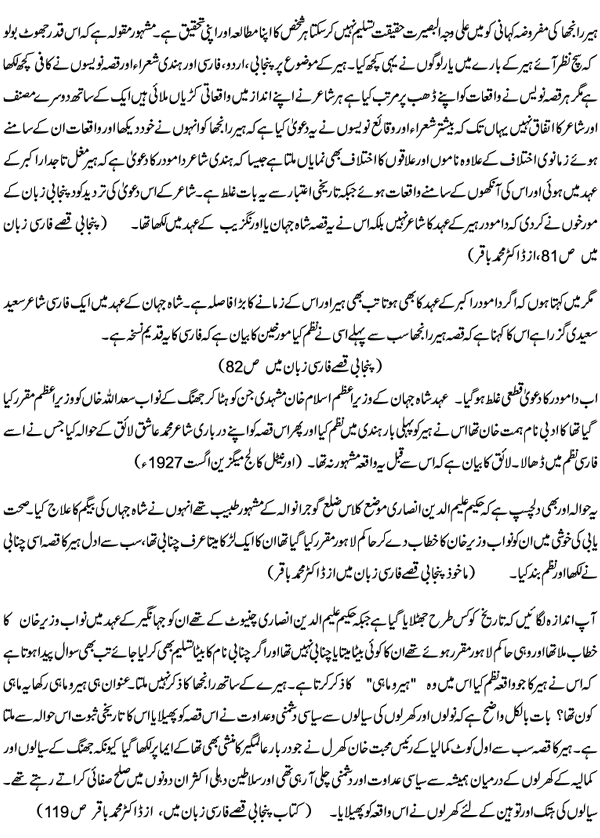
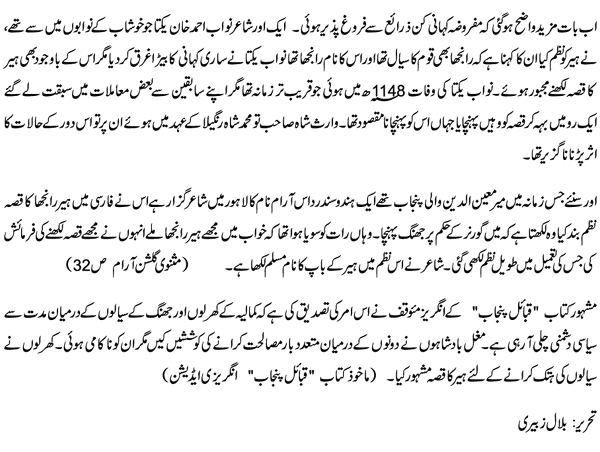







Comments